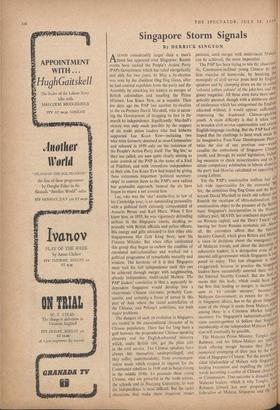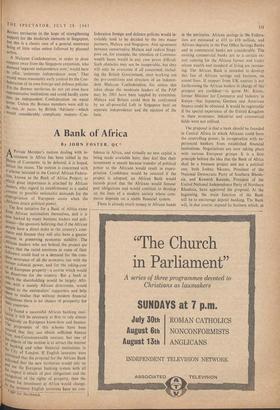Singapore Storm Signals
By DERRICK SINGTON A CLOUD considerably larger than a man's hand has appeared over Singapore. Recent events have rocked the People's Action Party (PAP) Government which has ruled energetically and ably for two years. In May a by-election was won by the dissident Ong Eng Guan, after he had courted expulsion from the party and the Assembly by attacking his leaders as stooges of British colonialism and assailing the Prime Minister, Lee Kuan Yew, as a nepotist. Then ten days ago the PAP lost another by-election to the ex-Premier David Marshall, who is accus- ing the Government of dragging its feet in the march to independence. Significantly, Marshall's victory was only made possible by the support of six trade' union leaders who had hitherto supported Lee Kuan Yew—including two who were formerly detained as near-Communists and released in 1959 only on the insistence of the People's Action Party itself. The 'Big Six,' as they arc called, are now quite clearly aiming to seize control of the PAP in the name of a kind of Fidelism, and with immediate independence as their aim. Lee Kuan Yew had hoped by giving these extremists important 'political secretary- ships' to convert them to the PAP's own radical but gradualist approach. Instead the six have begun to weave a net around him.
Lee, who was the 'star' double-first in law of his Cambridge year, is an outstanding personality with a political faith curiously compounded of Aneurin Bevan and Karl Marx. When I first knew him, in 1955, he was vigorously defending strikers in the Singapore courts, clashing re- peatedly with British officials and police officers. His energy and gifts attracted to him other able Singaporeans like Goh Keng Swee, now his Finance Minister. But when office confronted this group they began to eschew the crudities of emotional anti-colonialism and worked out a political programme of remarkable maturity and wisdom. The keystone of it is that Singapore must wait for full independence until this can be achieved through merger with neighbouring, already independent, multi-racial Malaya. The PAP leaders' conviction is that a separately in- dependent Singapore would develop into a chauvinistic Chinese city-state, probably Com- munist, and certainly a focus of unrest in this part of Asia where the racial assimilation of the Chinese, and Peking's ambitions, are both major problems.
The dangers of such an evolution in Singapore are rooted in the unassimilated character of its Chinese population. There has for long been a gulf between the preponderant Chinese-speaking elements and the English-educated minority which, under British rule, got the plum jobs in the civil service. The Chinese speakers have always felt themselves underprivileged, and they suffer, understandably, from overcompen- sation needs which erupted in support for the Communist rebellion in 1948 and in fierce rioting in the middle 1950s. To persuade these young Chinese, who are powerful in the trade unions, the schools and in Nanyang University, to wait for independence is most difficult. But the racial obsessions that make them impatient render patience, until merger with multi-racial Malaya can be achieved, the more imperative.
The PAP has been trying to win tin chauvinis. tic, Communist-inclined young Chinese by the firm exercise of home-rule, by breaking the monopoly of civil service posts held by English speakers and by clamping down on the so-called 'colonial yellow culture' of the juke-box and the glossy magazine. All three aims have been elle' getically pursued, though with a deliberate shovi of intolerance which has antagonised the English' educated without, it would appear, sufficiently impressing the frustrated Chinese-speakia youth. A main difficulty is that it takes tin" to broaden civil service opportunities and exter1J English-language teaching. But the PAP had hoped that the challenge to hard work made by its imaginative Four-Year Development Plan' twice the size of any previous one--wouid canalise the enthusiasm of Singapore Chines` youth; and through its social legislation, incluci" ing measures to check moneylenders and to 117 stitute compulsory arbitration in labour disputes' the party had likewise calculated on appealing to young Leftists. still Yet the PAP's constructive realism has left wide opportunities for the extremist 'Big Six,' the ambitious Ong Eng Guan and the flarlr, boyant David Marshall to touch old reflexes and flourish the mystique of ultra-nationalism. 11t emotionalists object to the presence of the Brills' base; Singapore's incorporation in the \Vestal' military pict, SEATO; her continued depencfel?c4 on Western capital; and the 'Don't Touch' sIgli barring her from Russian economic aid. Abosl all, the extremists affirm that the Internet Security Council, which gives Britain and Malaya a voice in decisions about the emergency 1151 of Malayan troops, and about the detention e' subversive leaders, is a derogation even of the internal self-government which Singapore is st11c; posed to enjoy. This last allegation is 11111 exaggerated, because in practice the SingaP°`4 . leaders have successfully asserted their will I0 „ the Internal Security Council. But the fact f; mains that this body, which could have beet the first link leading to merger, is increasing, seen as 'an outside snooper,' because t'ci Malayan Government, in return for its v°1 in Singapore affairs, has so far given SingaP°.ii none of the things it needs from Malaya. Chid among these is a Common Market (urge necessary for Singapore's industrialisation) 3r oi some encouragement to believe that Singallei membership of the independent Malayan Feder tion will eventually be possible. a The Malayan Prime Minister, Tungku Rahman, and his fellow-Malays are inhibilc" tt from offering merger because they fear numerical swamping of their race by the ac'`rf sion of Singapore's Chinese. Yet the present sided relationship of Malaya with Singallurev feeding extremism and impelling the isiaadi`sti wards becoming a centre of Chinese chauvin or Communism. That outcome is dreaded by Malayan leaders—which is why Tungku .At/ur Rahman himself has now proposed a e federation of Malaya, Singapore and the Borneo territories in the hope of strengthening support for the moderate elements in Singapore, but this is a classic case of a general statement being of little value unless followed by planned action.
A Malayan Confederation, in order to draw support away from the Singapore extremists, who demand 'separate independence now,' would have to offer 'corporate independence soon.' That would mean reasonably early control by the Con- federation of its own foreign and defence policies. Yet the Borneo territories do not yet even have representative institutions and could hardly come Into an independent Confederation on equal terms Unless the Borneo members were still to be run, de facto, by British 'Advisers'—which would considerably complicate matters—Con- federation foreign and defence policies would in- evitably tend to be decided by the two major partners, Malaya and Singapore. And agreement between conservative Malaya and radical Singa- pore on, for example, the retention of Common- wealth bases would in any case prove difficult. Such obstacles may not be insuperable, but they will only be overcome if all concerned, includ- ing the British Government, start working out the pre-conditions and structure of an indepen- dent Malayan Confederation, for unless this takes shape the moderate leaders of the PAP may by 1963 have been toppled by extremists. Malaya and Britain could then be confronted by an all-powerful Left in Singapore bent on separate independence and the ejection of the base.



































 Previous page
Previous page